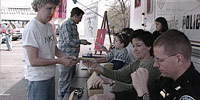Andrew Finstuen: Words Matter and Guns Kill
The national media and national leaders continue to refer to the terrible event in Newtown, Connecticut as tragic. Tragedies consist of humans who play a role in their suffering. The Greeks taught us that. Suffering by the innocent is pathetic. Theologian Reinhold Niebuhr opens The Irony of American History (1952) with this distinction, writing “Pathos arises from…confusions in history for which no reason can be given, or guilt ascribed.” With this in mind, the deaths of 20 children and six adults at Sandy Hook Elementary School are pathetic, not tragic.
The actual tragedy of Newtown, like all of our pathetic school, movie theater, and workplace shootings of recent decades, is that it reflects America’s careless gun laws and the careless words that surround them. The outrageous notion that “guns don’t kill people; people kill people” exemplifies this carelessness. Of course, guns kill—what else are they designed for?—and they kill people. If James Holmes in Colorado, Jacob Roberts in Oregon, and Adam Lanza in Connecticut had no gun in hand, they would not have been able to kill with such ease.

Such a careless attitude receives support from the National Rifle Association. Ironically, however, the NRA’s executive vice president and CEO Wayne LaPierre tacitly admits the inherent danger of guns in a November 27 blog post. He cites a study correlating the decrease in violent gun crime to increased gun ownership in Virginia. For LaPierre, the mere presence of guns owned by lawful citizens poses a threat to gun-toting criminals. Ultimately, the question of how guns and people interact to kill masks a deeper absurdity of the pro-gun lobby. LaPierre and the NRA offer only a tragic choice. Guns solve the problem of guns.
Newtown has momentarily silenced this argument. The NRA’s defense of guns at all costs is, oh, so costly. Yet their silence speaks loudly. Throughout history, those unwilling to speak against heart-wrenching, pathetic violence bear a tragic moral culpability.
Andrew Finstuen is director of the Honors College and associate professor of history at Boise State University, where he teaches courses in modern American history, the history of American Christianity, and the history of genocide and mass killing.



